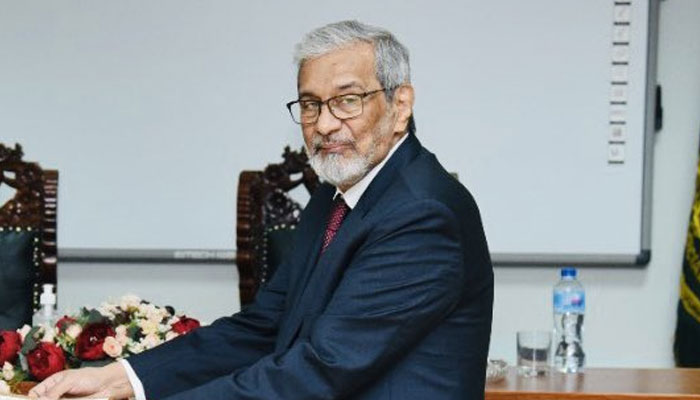Exclusion of certain judges from hearing sensitive cases tarnishes independence of judiciary: former SC judge
The ex-SC judge said the practice of exclusion of certain judges from sensitive cases also tends to affect the morale of judges who are consigned to irrelevant benches and foster feelings of ill-will and hostility amongst members of the bench
KARACHI: Former judge of Supreme Court Justice Maqbool Baqar on Saturday said that exclusion of certain judges from hearing of sensitive cases on account of their independent and impartial views has an adverse effect on the impartiality of judges and is also tarnishing the public perception about the independence of the judiciary.
Addressing the Sindh High Court Bar Association, Justice Baqar, who recently retired from the Supreme Court, said that the practice of exclusion of certain judges from sensitive cases also tends to affect the morale of judges who are consigned to irrelevant benches and foster feelings of ill-will and hostility amongst members of the bench.
On elevation of judges to the superior courts, he said that critical to the independence of the judiciary is an objective and transparent criteria for judicial appointments. He said that proceedings of the judicial commission of Pakistan and practice of preferring junior judges at the expense of their more senior colleagues has created fissures between the bar and the bench and within the judiciary as well. He ruled out the argument of some quarters about the need to prefer merit over seniority and said that in his considerate view it was without any foundation.
Regarding the controversy over appointments of judges in SHC in wake of Supreme Court’s notification that appointed present Chief Justice of SHC as ad-hoc judge of SC is in field, former SC Judge said that functioning of SHC has been afflicted with a constitutional crises and urged all the stakeholders to come together and address the issue at earliest.
He was of the view that appointment of junior judges not only fosters resentment within the bench but also disenchants senior judges who may feel slighted this affecting their performance.
He said that the absence of objective criteria for judicial elevations may pave the way for loyalists to be rewarded at the alter of fairness and objectivity.
He said that recalcitrance with respect to making the judicial commission’s proceedings more transparent and evolving the objective criteria severely affects the credibility of the judiciary.
He said that judiciary control neither the sword nor the purse and its strength lies merely in its credibility.
Regarding role of the judges, he said that judges particularly in our part of the world need to be cognizant of the severe disparities and volatility that underpin our society. He said that judges cannot afford to be blind residents of the elite institutions and they should rather be sensitive to the struggle of the common man and should be attuned to the humans that they are applying the law to. He said that more mechanized or highhanded the judiciary the further it moves from the application of justice.
He said that pendencies and delay severely impairs adjudication and justice today was neither inexpensive nor expeditious and urged that courts ought to employee modern technology to arrest unnecessary delays. He said that it would be also imperative the devote more resources to alternate forms of dispute resolutions.
-
 Justin Baldoni Objects To Removing Taylor Swift's Name From Case
Justin Baldoni Objects To Removing Taylor Swift's Name From Case -
 Princess Eugenie, Beatrice Warned About Royal Titles After They Turn Down Prince William's Request
Princess Eugenie, Beatrice Warned About Royal Titles After They Turn Down Prince William's Request -
 Samsung One UI 8.5 Adds Fully Customisable Unlock Animations
Samsung One UI 8.5 Adds Fully Customisable Unlock Animations -
 Injured By Bullets, New York Father-son Duo Beat Alleged Gunman With A Bat
Injured By Bullets, New York Father-son Duo Beat Alleged Gunman With A Bat -
 Annular Solar Eclipse 2026: Here's Everything To Know About The ‘ring Of Fire’
Annular Solar Eclipse 2026: Here's Everything To Know About The ‘ring Of Fire’ -
 Blake Lively Gives Up Hopes Of Taylor Swift Reconciliation?
Blake Lively Gives Up Hopes Of Taylor Swift Reconciliation? -
 Advocacy Groups Take Aim At Elon Musk, Urging Google, Apple To Remove X, Grok
Advocacy Groups Take Aim At Elon Musk, Urging Google, Apple To Remove X, Grok -
 BAFTA Nominees For 2026 Rising Star Award Revealed: See Full List
BAFTA Nominees For 2026 Rising Star Award Revealed: See Full List -
 Kate Middleton 'quietly And Carefully' Planning Prince William's Coronation
Kate Middleton 'quietly And Carefully' Planning Prince William's Coronation -
 'Glee' Star Slams Hilary Duff’s Husband Over 'petty' Remarks About THIS Actress
'Glee' Star Slams Hilary Duff’s Husband Over 'petty' Remarks About THIS Actress -
 Chinese Parents Turn To AI Tutors To Ease Homework Stress
Chinese Parents Turn To AI Tutors To Ease Homework Stress -
 Fire Crews Bring Massive Wolverhampton Factory Blaze Under Control
Fire Crews Bring Massive Wolverhampton Factory Blaze Under Control -
 Britney Spears Obsessed With Prince William And Harry?
Britney Spears Obsessed With Prince William And Harry? -
 World’s First Ice Archive Created To Preserve Fast-melting Glaciers’ Secrets
World’s First Ice Archive Created To Preserve Fast-melting Glaciers’ Secrets -
 Amazon To Appeal Against Italian Antitrust Fine Despite Major Reduction
Amazon To Appeal Against Italian Antitrust Fine Despite Major Reduction -
 Meghan Markle, Harry Land In New Trouble In US After Major Move
Meghan Markle, Harry Land In New Trouble In US After Major Move




